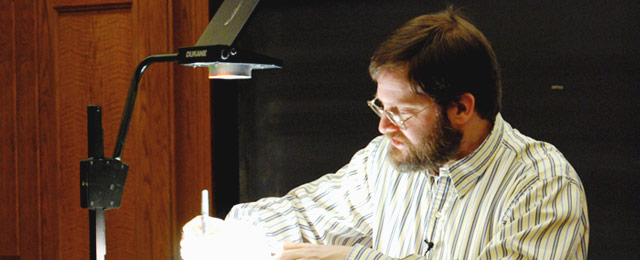Online courses directory (273)
This class covers basic concepts of nuclear physics with emphasis on nuclear structure and interactions of radiation with matter. Topics include elementary quantum theory; nuclear forces; shell structure of the nucleus; alpha, beta and gamma radioactive decays; interactions of nuclear radiations (charged particles, gammas, and neutrons) with matter; nuclear reactions; fission and fusion.
This course introduces students to climate studies, including beginnings of the solar system, time scales, and climate in human history. It is offered to both undergraduate and graduate students with different requirements.
Electromagnetic Theory covers the basic principles of electromagnetism: experimental basis, electrostatics, magnetic fields of steady currents, motional e.m.f. and electromagnetic induction, Maxwell's equations, propagation and radiation of electromagnetic waves, electric and magnetic properties of matter, and conservation laws. This is a graduate level subject which uses appropriate mathematics but whose emphasis is on physical phenomena and principles.
The central theme of this course is the interaction of radiation with biological material. The course is intended to provide a broad understanding of how different types of radiation deposit energy, including the creation and behavior of secondary radiations; of how radiation affects cells and why the different types of radiation have very different biological effects. Topics will include: the effects of radiation on biological systems including DNA damage; in vitro cell survival models; and in vivo mammalian systems. The course covers radiation therapy, radiation syndromes in humans and carcinogenesis. Environmental radiation sources on earth and in space, and aspects of radiation protection are also discussed. Examples from the current literature will be used to supplement lecture material.
The seminar explores current issues in space policy as well as the historical roots for the issues. Emphasis on critical policy discussion combined with serious technical analysis. The range of issues covers national security space policy, civil space policy, as well as commercial space policy. Issues explored include: the GPS dilemma, the International Space Station choices, commercial launch from foreign countries, and the fate of satellite-based cellular systems.
This course offers you the opportunity to gain a deeper understanding of the life and work of the young Albert Einstein and especially his mind-bending special theory of relativity.
Explore motion in the real world using modern tools and techniques (video capture and analysis, computer modeling) guided by fundamental physics principles.
This course focuses on three particularly interesting areas of astronomy that are advancing very rapidly: Extra-Solar Planets, Black Holes, and Dark Energy. Particular attention is paid to current projects that promise to improve our understanding significantly over the next few years. The course explores not just what is known, but what is currently not known, and how astronomers are going about trying to find out.
Cognitive robotics addresses the emerging field of autonomous systems possessing artificial reasoning skills. Successfully-applied algorithms and autonomy models form the basis for study, and provide students an opportunity to design such a system as part of their class project. Theory and application are linked through discussion of real systems such as the Mars Exploration Rover.
This course has been designed as a seminar to give students an understanding of how scientists with medical or scientific degrees conduct research in both hospital and academic settings. There will be interactive discussions with research clinicians and scientists about the career opportunities and research challenges in the biomedical field, which an MIT student might prepare for by obtaining an MD, PhD, or combined degrees. The seminar will be held in a case presentation format, with topics chosen from the radiological sciences, including current research in magnetic resonance imaging, positron emission tomography and other nuclear imaging techniques, and advances in radiation therapy. With the lectures as background, we will also examine alternative and related options such as biomedical engineering, medical physics, and medical engineering. We'll use as examples and points of comparisons the curriculum paths available through MIT's Department of Nuclear Science and Engineering. In past years we have given very modest assignments such as readings in advance of or after a seminar, and a short term project.
This free online Physics course covers electronics, electric systems, magnets, sounds and transformers, and much more. It provides a comprehensive grounding in Physics and is ideal as a complement to regular classes, a study or revision aid, or as a resource for someone pursuing an interest in basic science.
The Experimental Project Lab in the Department of Aeronautics and Astronautics is a two-semester course sequence: 16.621 Experimental Projects I (this course) and 16.622 Experimental Projects II. This site offers material on 16.621. In the course, two-person teams initiate a project of their own conception and design in 16.621 and then complete it in 16.622. For many students, this is a first encounter with research standards and techniques. It is a complicated course that requires a lot of interaction and support and also access to facilities and materials, but it is rewarding for students to explore an hypothesis under the guidance of a faculty advisor.
This OCW site presents the building block materials of the course, which can provide only a profile of the course because the most important learning elements are the interactions between student team, faculty, project advisor, and shop staff and also between student team members. However, this site offers some of the preparation and guidance materials for students embarking on an experimental project. To emphasize the focus on communication skills, a set of study materials and examples of student work are provided.
Using vectors to study motion is a fundamental skill to have when studying physics. Vector quantities used to describe the physical world include displacement, velocity, acceleration, and force. In this free online physics course the standard way to represent vectors and their axes as well as unit vector notation are explained in a clear and step-by-step manner. Examples show how to work out the angle or distance necessary to get the desired displacement. Using two known variables you will learn how to work through the process of calculating the remaining value, such as time in air or horizontal displacement using a variety of techniques. This free online physics course will be of great interest to students who are studying physics, chemistry, engineering, mathematics, and to students who wish to pursue a career in any of the sciences or engineering fields, and even the sportsperson who wants to plan for a specific outcome when hitting a golf ball or batting a ball.<br />
Lecture Series on Classical Physics by Prof.V.Balakrishnan, Department of Physics, IIT Madras.
This course deals with structural components in nuclear power plant systems, their functional purposes, operating conditions, and mechanical-structural design requirements. It combines mechanics techniques with models of material behavior to determine adequacy of component design. Considerations include mechanical loading, brittle fracture, in-elastic behavior, elevated temperatures, neutron irradiation, and seismic effects.
Space System Architecture and Design incorporates lectures, readings and discussion on topics in the architecting of space systems. The class reviews existing space system architectures and the classical methods of designing them. Sessions focus on multi-attribute utility theory as a new design paradigm for space systems, when combined with integrated concurrent engineering and efficient searches of large architectural tradespaces. Designing for flexibility and uncertainty is considered, as are policy and product development issues.
Numerous recent studies have shown that the U.S. has relatively low percentages of students who enter science and engineering and a high drop-out rate. Some other countries are producing many more scientists and engineers per capita than the U.S. What does this mean for the future of the U.S. and the global economy?
In this readings and discussion-based seminar you will meet weekly with the Dean of Undergraduate Education to explore the kind of education MIT and other institutions are and should be giving. Based on data from National Academy and other reports, along with what pundits have been saying, we'll see if we can decide how much the U.S. may or may not be at risk.
This course serves as an introduction to computational techniques arising in aerospace engineering. Applications are drawn from aerospace structures, aerodynamics, dynamics and control, and aerospace systems. Techniques include: numerical integration of systems of ordinary differential equations; finite-difference, finite-volume, and finite-element discretization of partial differential equations; numerical linear algebra; eigenvalue problems; and optimization with constraints.
In this course, we will look at many important aspects of the circulation of the atmosphere and ocean, from length scales of meters to thousands of km and time scales ranging from seconds to years. We will assume familiarity with concepts covered in course 12.003 (Physics of the Fluid Earth). In the early stages of the present course, we will make somewhat greater use of math than did 12.003, but the math we will use is no more than that encountered in elementary electromagnetic field theory, for example. The focus of the course is on the physics of the phenomena which we will discuss.
This course is a graduate level subject on electromagnetic theory with particular emphasis on basics and applications to Nuclear Science and Engineering. The basic topics covered include electrostatics, magnetostatics, and electromagnetic radiation. The applications include transmission lines, waveguides, antennas, scattering, shielding, charged particle collisions, Bremsstrahlung radiation, and Cerenkov radiation.
Acknowledgments
Professor Freidberg would like to acknowledge the immense contributions made to this course by its previous instructors, Ian Hutchinson and Ron Parker.
Trusted paper writing service WriteMyPaper.Today will write the papers of any difficulty.





















